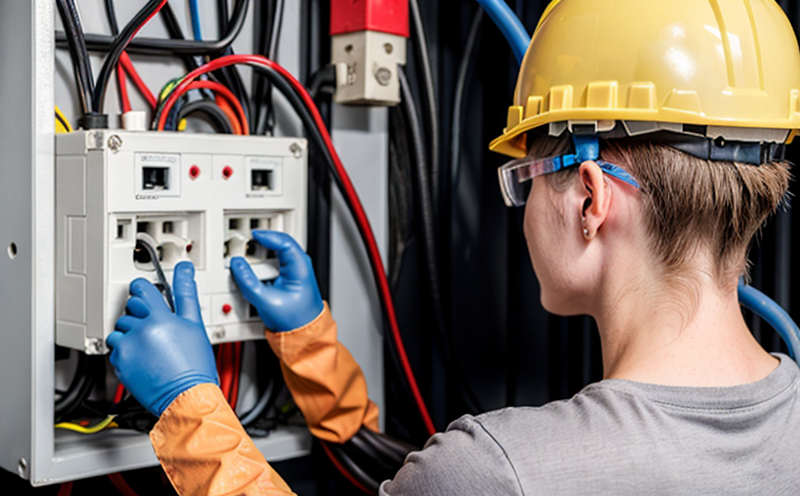ANSI/UL 508 Electrical Safety of Control Devices in Smart Systems
The ANSI/UL 508 standard is a cornerstone for ensuring electrical safety and compliance with control devices used in smart systems. This standard applies to industrial control panels, motor control centers, and low-voltage power distribution equipment. Compliance ensures that these devices are safe from hazards such as electric shock, fire, and arc flash, which can arise due to improper design or installation.
The scope of ANSI/UL 508 includes the testing and certification procedures for ensuring that electrical systems meet safety requirements. This standard is widely recognized in North America and is used globally by manufacturers, engineers, and regulatory bodies. The test parameters involve rigorous checks on the control devices' ability to withstand specified voltage levels, current, and other environmental stresses.
For R&D engineers and quality managers, ANSI/UL 508 compliance is crucial for product development and market entry. By adhering to this standard, they ensure that their products meet stringent safety criteria without compromising on performance or functionality. This is particularly important in the context of smart home and IoT devices where reliability and security are paramount.
The testing process involves a series of steps designed to assess the control device's ability to operate safely under various conditions. These tests include:
- Insulation resistance measurement
- Voltage withstand test
- Current interruption capacity evaluation
- Environmental stress tests (humidity, temperature)
- Arc flash testing
The acceptance criteria for ANSI/UL 508 are stringent and based on international standards. These include compliance with the latest versions of IEEE, IEC, and other recognized safety guidelines. Failure to meet these criteria can result in product recalls or delays in market entry.
For procurement officers, ensuring compliance with ANSI/UL 508 is essential for selecting reliable suppliers and products that meet global safety standards. This standard ensures that the control devices are not only safe but also robust enough to handle the demands of modern smart systems.
Why It Matters
The importance of ANSI/UL 508 compliance cannot be overstated, especially in the context of smart home and IoT devices. These devices operate within environments that are increasingly interconnected, making them more susceptible to electrical hazards if not properly designed and tested.
Injuries due to electric shock or fires caused by improperly installed control panels can have severe consequences for both users and manufacturers. ANSI/UL 508 helps mitigate these risks by providing a framework for rigorous testing and certification processes. This ensures that the devices are safe, reliable, and meet regulatory requirements.
From a business perspective, compliance with ANSI/UL 508 can significantly enhance brand reputation and market credibility. Customers today demand products that not only function well but also ensure their safety. By adhering to this standard, manufacturers demonstrate their commitment to quality and safety, which can lead to increased customer trust and loyalty.
Moreover, compliance with ANSI/UL 508 can open up new markets and opportunities for growth. Many countries have adopted international standards as the basis for local regulations, making ANSI/UL 508 a valuable asset for expanding into global markets.
Customer Impact and Satisfaction
The impact of ANSI/UL 508 compliance extends beyond regulatory requirements to directly benefit customers. By ensuring that the control devices are safe and reliable, manufacturers can provide products that enhance user experience without compromising on safety.
CUSTOMER IMPACT AND SATISFACTION:
- Reduces risk of electrical accidents
- Improves product durability and reliability
- Enhances brand reputation and customer trust
- Promotes regulatory compliance and market access
- Supports innovation in smart home and IoT devices
These benefits translate into higher customer satisfaction, which is crucial for long-term relationships and repeat business. By adhering to ANSI/UL 508, manufacturers can ensure that their products meet the highest safety standards, thereby gaining a competitive edge in the market.
Competitive Advantage and Market Impact
The adherence to ANSI/UL 508 provides significant advantages for businesses operating in the smart home and IoT device sector. By ensuring that their products meet these stringent safety standards, manufacturers can differentiate themselves from competitors who may not adhere to such rigorous testing protocols.
- Enhanced Safety Reputation: Compliance with ANSI/UL 508 enhances a brand's reputation for producing safe and reliable products, which is crucial in the smart home sector where security and safety are paramount.
- Regulatory Compliance: By meeting international standards, manufacturers ensure that their products comply with local regulations, thereby opening up new markets and opportunities for growth.
- Innovation Support: ANSI/UL 508 encourages innovation in smart home devices by setting high safety benchmarks. This allows businesses to focus on developing cutting-edge features without compromising on safety.
- Better Customer Trust: Compliance with this standard builds trust among consumers, who are increasingly concerned about the safety and security of their connected devices.
The competitive advantage provided by ANSI/UL 508 compliance is significant. It not only helps businesses meet regulatory requirements but also sets a benchmark for industry best practices. This can lead to increased market share and customer loyalty, ultimately driving business growth.
In the global market, where competition is fierce, adherence to international standards like ANSI/UL 508 can be a decisive factor in standing out from the crowd. By ensuring that their products meet these stringent safety criteria, manufacturers can gain a competitive edge and tap into new markets with ease.





